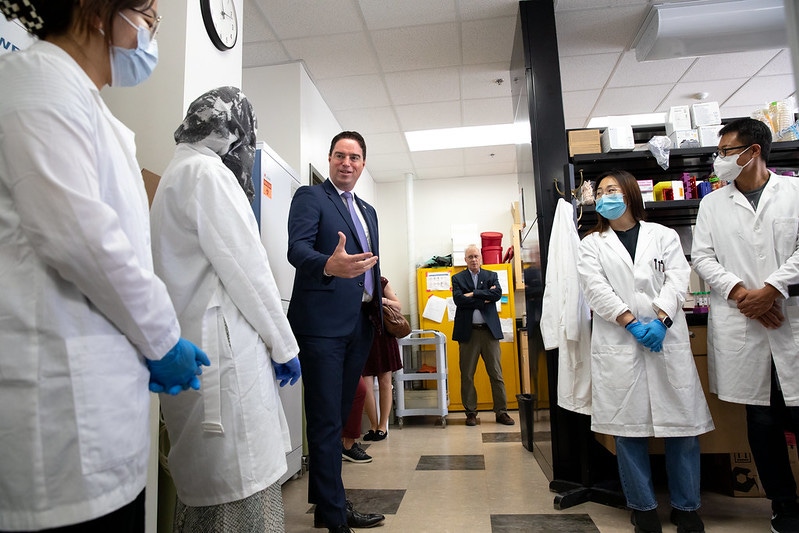UW-Madison, Ireland partner on new treatment for S. suis in pigs
Research team is studying how bacteriophages might be a solution for the bacterial pathogen.
August 25, 2022

Research aimed at improving pig health and advancing understanding of beneficial viruses drew a visit from a foreign minister to the University of Wisconsin–Madison last week. Martin Heydon, a Minister of State at Ireland's Department of Agriculture, Food and the Marine, learned about research being done by scientists at the College of Agricultural and Life Sciences and three Irish institutions through an international partnership. Accompanied by officials from the Irish Embassy to the United States and the Irish Consulate in Chicago, Heydon also met with an Irish Fulbright scholar conducting dairy research in Wisconsin.
At Babcock Hall, the delegation was invited into the lab of J.P. van Pijkeren, an associate professor of food science and a co-principal investigator of a project seeking new treatments for Streptococcus suis, a bacterial pathogen of pigs. S. suis affects pigs worldwide, causing pneumonia, arthritis, skin lesions and even death.
Van Pijkeren's partners on the project hail from Queens University of Belfast, University College Cork,and Teagasc (an Irish research authority in the agricultural and food sectors). It is one of several projects funded by the U.S.-Ireland Research and Development Partnership, a tripartite collaboration between the USDA and its equivalents in the Republic of Ireland and Northern Ireland.
"This is an international, collaborative effort to build an antimicrobial platform focusing on S. suis, but ultimately, we think that this may be applicable to other pathogens, too," says van Pijkeren.
Heydon told UW–Madison researchers that Ireland is thrilled to partner with Wisconsin on the research, adding that pork is an important agricultural product in Ireland, as it is in the United States.
According to Tom Crenshaw, a professor of animal and dairy sciences at UW–Madison and an expert in swine nutrition and health not involved in the study, there is currently no effective way to prevent S. suis infections.
"It's hard to wipe out because it's harbored in the tonsils and lymph nodes," says Crenshaw. He noted that S. suis can also infect humans, especially farmers and others who work closely with pigs.
Antibiotics are an effective treatment, but the rise of antibiotic resistant bacteria inspired van Pijkeren and his collaborators to look for alternative treatments to this problematic bacterium.
The research team is studying how bacteriophages — "phages" for short — might be a solution.
Phages are viruses that evolved over millions of years to be able to infect and even kill bacteria. Van Pijkeren says the goal of the project is to harness the power of phages to kill and eradicate S. suis.
One way a phage can kill bacteria is by releasing enzymes that break down the bacterium cell wall, effectively killing it. Van Pijkeren's lab is using this concept and phage DNA to engineer probiotic bacteria that, like phages, would release enzymes targeting S. suis. And the lab is developing a second probiotic bacterium that will deliver phages, instead of enzymes, to target S. suis. The phage DNA that van Pjikeren's lab is leveraging, which codes for enzyme production, was isolated by Queen's University of Belfast from a phage biobank collected by University College Cork and Teagasc.
After visiting the Babcock Hall lab, the Irish delegation met with Irish Fulbright Scholar Conor Holohan at Bascom Hall. Holohan, who recently earned his PhD in animal and grassland science from the School of Agriculture and Food Science at University College Dublin, has been working with Matt Akins, an animal and dairy sciences scientist and dairy extension specialist, at Marshfield Agricultural Research Station. Holohan's work is focused on developing an extension program aimed at increasing the adoption of pasture feeding on dairy farms.
Source: UW-Madison CALS, which is solely responsible for the information provided, and wholly owns the information. Informa Business Media and all its subsidiaries are not responsible for any of the content contained in this information asset.
You May Also Like



